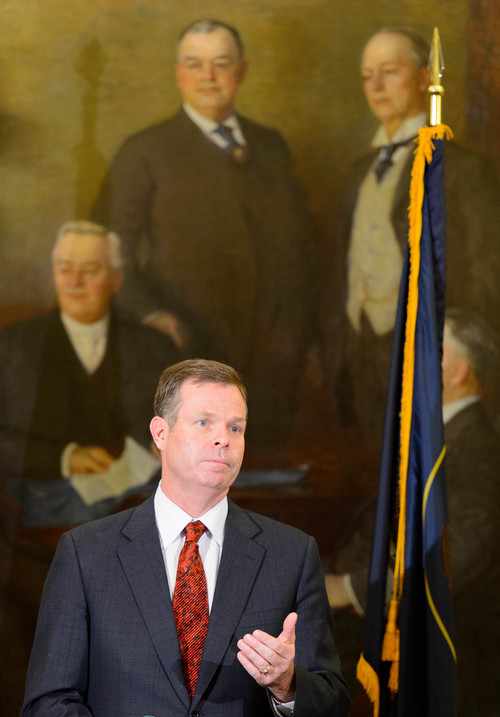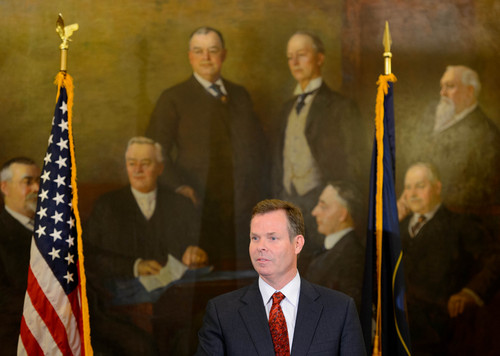This is an archived article that was published on sltrib.com in 2013, and information in the article may be outdated. It is provided only for personal research purposes and may not be reprinted.
Attorney General John Swallow's Dec. 3 departure date — announced when he submitted his resignation last week — may be more than just a convenient time to wrap up his time in office.
It could mean tens of thousands of dollars for his retirement, money he never would see were he to bow out just a few days earlier.
By mak- ing it past Dec. 1, Swallow will have accumulated four years in state government, a magic threshold that qualifies employees for the pension system.
That means the soon-to-be-former attorney general will be able to collect a state pension of about $12,000 a year once he reaches retirement age.
That amount comes on top of a separate state pension, pegged at about $2,000 a year, he was already eligible for after his six years in the Utah House.
Dan Andersen, executive director of Utah Retirement Systems, said he couldn't comment specifically on Swallow's case, but noted the legislative and state employee retirement systems are separate.
To qualify for a state pension and begin receiving that benefit at age 65, the public employee must earn four years of service credit. Service in the part-time Legislature does not count toward eligibility for the state employee pension system.
Because Swallow worked for the state for four years, he would be eligible for 8 percent of his average salary during his highest-earning three years. He made about $150,000 a year while he was chief deputy attorney general from Dec. 1, 2009, until he became attorney general in January 2013, when his salary dropped to $104,400.
Therefore, Swallow would be able to collect $12,000 a year once he reaches age 65. He turned 51 earlier this month.
Swallow cited money concerns as a key factor in his decision to leave office. During his resignation speech Thursday, he pointed to the financial toll of investigations by the Utah House, the lieutenant governor's office and two county attorneys working in conjunction with the FBI, saying the multiple probes were too much for him to bear.
He said he had racked up about $300,000 in legal fees and hoped that stepping aside would alleviate some of the financial strain.
His announcement came a day before the lieutenant governor's office released a highly critical report that found Swallow broke multiple election laws in failing to disclose nearly $60,000 worth of income on his conflict-of-interest forms.
Swallow's spokesman, Paul Murphy, told KUTV that the reason for the date of Swallow's departure — Dec. 3 at 12:01 a.m. — was simply a matter of wanting to take a vacation that had been planned to start Saturday before wrapping up loose ends in the office.
As an elected constitutional officer, Swallow does not accrue or use vacation time.
Murphy said he did not know if the state pension weighed into the timing of his boss's departure.
Utah Democratic Party Chairman Jim Dabakis was shocked to learn the timing of Swallow's last day on the job could mean he'd be collecting a pension.
"It certainly fits the pattern of Mr. Swallow, to be thinking about himself exclusively," Dabakis said. "If he's found guilty, I hope he collects his pension in the penitentiary."
Twitter: @RobertGehrke —
Dems seeking special election
Utah Democrats will go to court Tuesday to challenge the governor's authority to appoint a Republican attorney general to succeed John Swallow.
"If he did cheat, was there a valid election?" asked Utah Democratic Party Chairman Jim Dabakis, who is also a state senator from Salt Lake City. "It's certainly not clear that the governor — who seems awfully anxious to pick the next attorney general — gets to do that."
Democrats contend, based on a report released Friday by the lieutenant governor's office, that Swallow broke state election laws and that the proper remedy is for a judge to invalidate the election.
If the election is voided, they argue, Republicans never held the seat and a special election should decide Swallow's replacement.
The party plans to have a news conference Tuesday to announce its lawsuit.
Friday's report from the lieutenant governor's special counsel recommended asking a judge to invalidate the election and to declare the office vacant.
In Republican Party circles, Swallow's announced resignation the day before appeared to make such action moot, though new Lt. Gov. Spencer Cox said his office is still weighing its next move.
The GOP's State Central Committee is scheduled to meet Dec. 14 to narrow its field of possible replacements. Republicans plan to send the names of three choices to Gov. Gary Herbert, who then would pick one to serve as attorney general until a candidate is elected in November 2014 and sworn in come January 2015.







